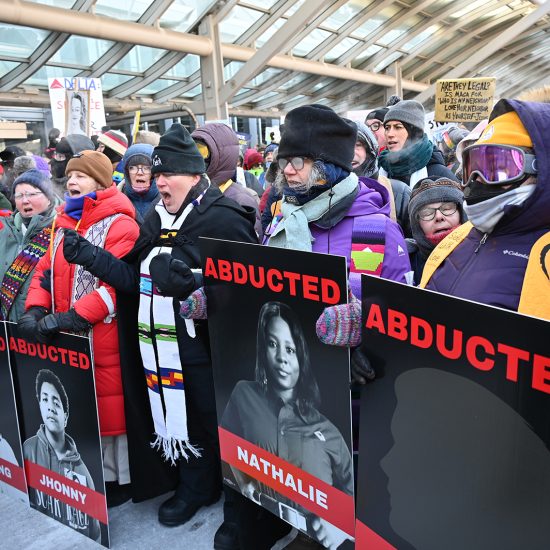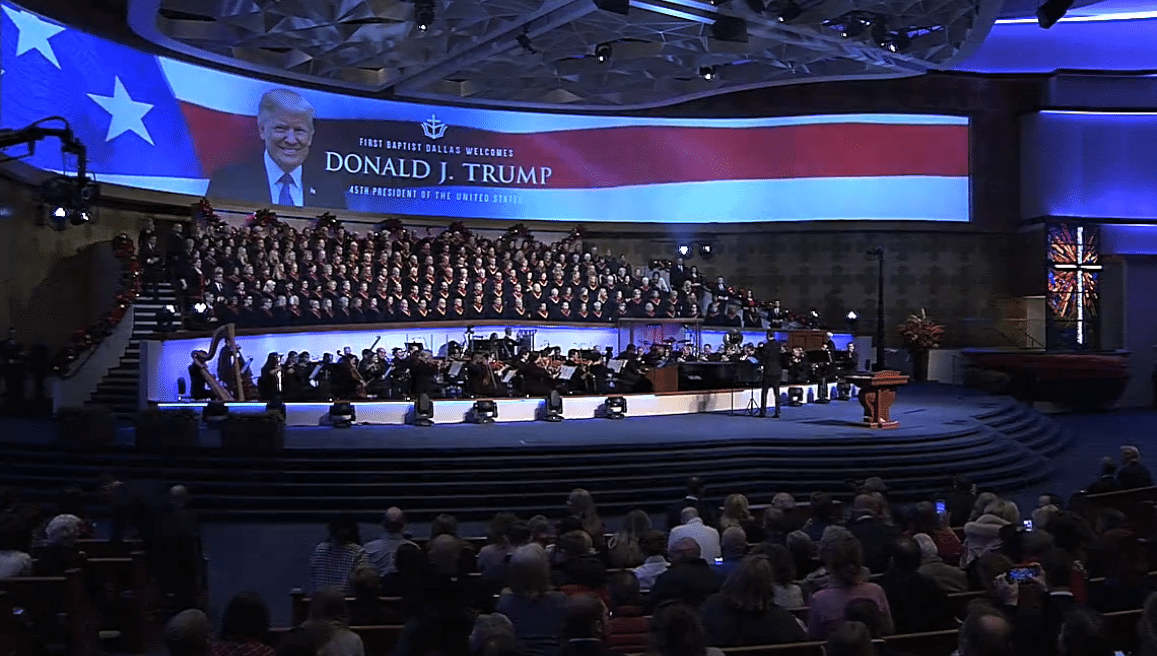
“It’s America First and Make America Great Again, and we will do it,” former President Donald Trump declared at the end of a speech on Sunday (Dec. 19).
The crowd erupted with applause and cheers. Inside the standing ovation, a chant rose up as Trump started walking away. He paused, pumped his fist, and encouraged it to grow louder.
“USA! USA! USA!”
And then after a couple announcements, the crowd started singing, “O come let us adore him.”
That’s how the “worship” service at First Baptist Church in Dallas, Texas, ended for the last Sunday of Advent.
And Trump’s message wasn’t just something tacked onto the end of the Sunday gathering. From the beginning to the end, the day focused on Trump. His picture featured prominently on the bulletin along with a distant Jesus in the manger.
After seasonal instrumental music to start the service, a voice came from on high through the sanctuary’s speakers: “Ladies and gentlemen, please welcome the 45th president of the United States of America, President Donald J. Trump.” Trump walked into the sanctuary (late) along with the church’s pastor, Robert Jeffress, to a standing ovation. With his image and an American flag on the big screen, Trump waved while ushered to the front row as the congregation continued applauding and watching him through their cellphone screens.
Ignored was the admonition in the Book of James to avoid favoritism toward wealthy guests who take people to court to defraud them and blaspheme the name of God (maybe Jeffress missed that section as he’s not made it past Two Corinthians yet).
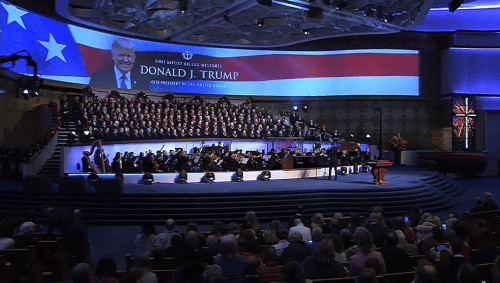
Screengrab during Sunday’s service at First Baptist Church in Dallas, Texas.
From that point on, the name of Trump gave Jesus a run for his money in mentions from the pulpit during a service riddled with theological faux pas. And the crowd seemed to long for the advent of Trump’s second coming in the Oval Office
In this issue of A Public Witness, we attend First Baptist’s “special” Christmas service to detail the clash of liturgies. We give special attention to the inherent political implications of Jesus’s birth. As a benediction, we reflect on the damage moments like this do to the witness of the Church.
Unto Us
After the seating of Trump, the congregation sang a couple traditional Christmas hymns. Jeffress then welcomed people to the service, including “the hundreds of thousands” watching online — though the counter at the time showed just 9,949 viewers (apparently Baptist preachers citing their attendance is a bit like Trump counting his votes). Jeffress mentioned two events coming up for “Christmas week”: the church’s Christmas Eve services and his upcoming appearances on Fox News. The crowd applauded the latter.
The Foxvangelist then introduced the “special guest” as “one of my closest friends.”
“He’s not only a great friend of mine, but he is a great friend of this church and he is a great friend of Christians everywhere,” Jeffress said to applause. “I can say this without any dispute at all: He is the most pro-life, pro-religious liberty, pro-Israel president in the history of the United States of America.”
While we would dispute all three of those designations, the “pro-Israel” one seemed particularly audacious on the heels of Trump expressing antisemitic tropes and attacking former Israeli Prime Minister Benjamin Netanyahu (including using the ‘f-word’ toward the Israeli leader loved by U.S. evangelicals). Nonetheless, the crowd jumped to another standing ovation as Trump stood up and waved to his adoring congregants. Jeffress then noted Trump would speak later as “the climax of the conclusion of the service.”
After a few more Christmas carols, Jeffress returned to stage for his sermon that started with another welcome to all those watching and to “our friend and great president, President Donald J. Trump” — which sparked more clapping and cheering (bringing the score up to something like Trump 4, Fox News 1, Jesus 0).
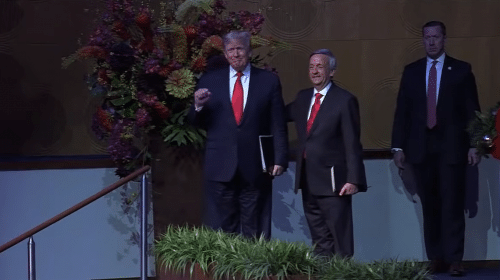
Screengrab during Sunday’s service at First Baptist Church in Dallas, Texas.
The name of Trump repeatedly appeared in the sermon with multiple references on three more occasions, including using Trump as a character in an imaginary sermon illustration and describing a visit with Trump in the Oval Office. The latter was a story about Trump pardoning someone as an example of what it means for God to pardon Christians for their sins (so, yes, Trump in the metaphor is the God figure).
Then during the altar call — after asking everyone to bow their heads and close their eyes — Jeffress mentioned that Trump would soon speak. Jeffress also, for the third time in the service, claimed “hundreds of thousands” of people were watching online.
“And now for something that I know we all have been waiting for during this service,” Jeffress said as he moved right from the altar call to another introduction of Trump. “One of the greatest privileges of my life has been being able to count Donald Trump as a friend.”
Jeffress recalled being with Trump on election night in 2016, again listed the things Trump is supposedly the most pro at among presidents (which again sparked applause), and claimed Trump helped get people to say “Merry Christmas” again (though we don’t recall stopping).
Off Script
Trump walked up to the pulpit to another standing ovation and with his image again showing up on the large screens in the sanctuary. After Jeffress embraced him with “I love you” and the crowd finally quit cheering, Trump started by praising how “beautiful” the sanctuary was, something he would repeat again later as he promised to bring Melania next time (with the inference that she didn’t come because they didn’t realize the sanctuary was actually beautiful).
Recounting the first time he heard Jeffress on TV back in 2015 talking about supporting Trump, the former president praised Jeffress as one who “does very well on television and spreading the word.”
After claiming to have done “a real job” in “saving Christianity,” Trump said “our nation’s in great trouble” because of the Afghanistan withdrawal, “the borders,” and inflation. He added, “There’s a lot of clouds hanging over our country right now, very dark clouds. But we will come back bigger and better and stronger than ever before.”
He eventually picked up his script and acknowledged (and mocked) that someone had written “beautiful words” for him, but he said he instead wanted to “speak from the heart.” From that point on, Trump bounced back-and-forth between reading from the script and speaking extemporaneously — drawing numerous interruptions of applause. He spent a minute, off script, complaining about how the media covered the Christmas decorations in the White House during his presidency.
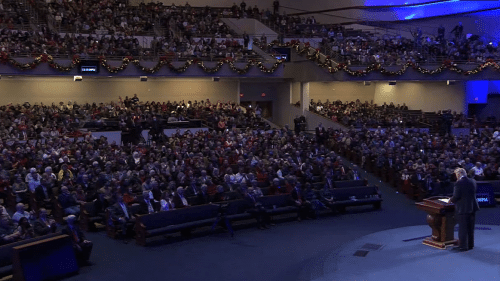
Screengrab during Sunday’s service at First Baptist Church in Dallas, Texas.
His explicitly Christian comments came in the script he started off by mocking, struggled to read, and often stopped to offer side comments like after reading a line about the shepherds being told that a savior had been born.
“When I was listening to Robert, perhaps unknowingly you used the word ‘savior’ a lot, and our country needs a savior right now and our country has a savior,” he said before adding after a few scattered cheers from the congregation, “That’s not me, that’s somebody much higher up than me.”
Back on script, he leaned into Christian Nationalism by talking about the “miraculous founding” of the country and the impact thereon of Jesus’s teachings.
“We have an incredible country,” Trump added off script. “It will be more incredible in years to come. We will do what has to be done to Make America Great Again. We are going to Make America Great Again; we are never going to forget that message.”
After the applause, he ended and walked off to the “USA” chants.
Get cutting-edge analysis and commentary like this in your inbox every week by subscribing today!
In Days of Caesar Augustus
Throughout the service on Sunday, the focus of praise alternated between Jesus and Trump. The congregation praised and even adored (dare we say worshiped) two rulers. One for the spiritual kingdom in the next life and one for the here and now. Stripping away the political significance of the advent of Jesus created a vacuum for another king.
Jeffress accidentally exposed the dangerous irony of making Jesus merely the lord of the afterlife. Reading from Luke’s account of Jesus’s birth that mentions the Roman emperor, Jeffress said in his sermon, “He’s known as Caesar Augustus. That was his title, but his real name was Octavian.”
“He was the most powerful man in the world,” Jeffress declared before adding with a grin, “There’s only one person in our audience today who knows how that feels, to be the most powerful man in the world.”
Trump as Caesar Augustus?
Jeffress didn’t seem to catch the irony of lauding Caesar in the sanctuary, but he played on the metaphor as he referred to the tax census that led Joseph and Mary to Bethlehem as the result of Augustus “signing that executive order.”
Unintentionally, Jeffress got right to the heart of the problem with his own church service. He presented Augustus as a figure who accidentally helped the fulfillment of “prophecies” about the birth of Jesus. In that version of the story, Augustus used power in a way that helped bring about God’s salvation. That view of power and the biblical story ignores the politics in the text. And worse, it can be used to explain away the injustices of a Roman emperor in the name of praising the “fulfillment” of God’s will.
After all, many of the titles used in Luke 2 (and elsewhere) take terms claimed by Caesar Augustus and, in an act of direct political challenge, reappropriate them to be about Jesus. Like “Messiah,” “Lord,” “Son of God,” and — of course — “Savior.” Furthermore, invoking the line of David is an explicit challenge to the legitimacy of the Caesar who rules the land but actually stole the office with a rigged process. If Jesus is Lord, then Caesar isn’t — which is why when the people chant for crucifying Jesus they also cry out, “We have no king but Caesar!” (Or, maybe in a modern translation, “USA!” after a Caesar Augustus figure promises “America First.”)
Even more than disobeying the clear teaching of James 2 about not showing favoritism, this comparison by Jeffress highlights exactly how we got to the point of a sanctuary full of people cheering for Trump six days before we allegedly “celebrate” the birth of the one an angel called “the Messiah, the Lord.”
Angela Parker, author of If God Still Breathes, Why Can’t I? and an assistant professor of New Testament and Greek at Mercer University’s McAfee School of Theology, explained to us after the service the problem of praising power like Jeffress did.
“In the context of a ‘worship’ experience, should we be praising a Caesar Augustus figure who was notorious for warmongering, quashing any type of rebellion against his absolute rule, exploiting the rural areas of the Roman Empire in order to line his own coffers with gold, silver, and all of the trappings of exploited land? The problem of such worship is that it dismisses Mary’s Magnificat in Luke 1:52-53 where she states that God will bring ‘down the powerful from their thrones’ and send the ‘rich away empty,’” Parker explained. “True worship will highlight a gospel that transforms politics, society, and economics just as Mary’s song argues.”
“Jesus’s work and ministry on earth belies the understanding of the Emperor who exploits,” Parker added. “Jesus feeds the hungry when the Empire takes their food. Jesus provides health care when the Empire makes people sick. Finally, Jesus overturns the economic system when the Jerusalem Temple buys and sells for the Roman Emperor. The true gospel never begins with Caesar Augustus. Jesus is where the true gospel begins and resides.”
To that, all God’s people say, “Amen.” But others erupt in protest: “USA!”
Help sustain the ministry of Word&Way by subscribing to A Public Witness!
The Wrong Witness
In many ways, Trump symbolizes the tensions between contemporary American culture and Christianity’s historic beliefs and practices. The former president rarely attends church, is biblically illiterate, and disavows basic Christian ideas like the universality of human sin and the need to seek forgiveness from God. Whether in the form of sex scandals, coarse language, or vicious attacks on others, he is far from a exemplar of piety and reportedly mocks his religious supporters in private.
Yet, with Jeffress and other Trumpian leaders at the helm, America’s largest Protestant denomination continues to be remade in the image of Trump, professing belief in fringe conspiracy theories instead of proclaiming the gospel. This devolution is hugely consequential for both the identity of the SBC and the broader witness of U.S. Christianity. At the SBC meeting this past summer, leaders even pulled a resolution denouncing the Jan. 6 insurrection, along with disavowing the use of threats, violence, and misinformation in politics. The inability to speak in unison left a deafening silence.
Jeffress meanwhile is not hiding his agenda. Whether inviting Trump to play such a prominent role in worship or preaching a sermon labeling Joe Biden’s presidency “the ungodliest presidential administration we’ve had in the history of our country,” he is quite clear about his faith. For Jeffress, God is a partisan who has chosen Trump as a savior.
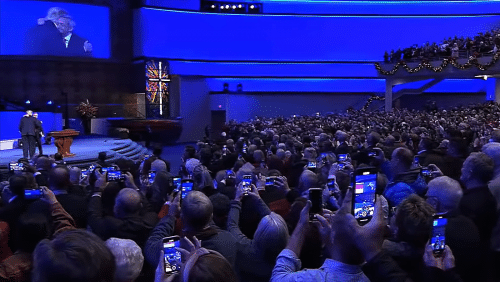
Screengrab during Sunday’s service at First Baptist Church in Dallas, Texas.
As Bill Jones, former executive director of Texas Baptists Committed (an organization that challenged fundamentalism in Southern Baptist life), told us after Sunday’s service, “Jeffress’s embrace of Trump from the pulpit on Sunday adds to the perception that the primary mission of the SBC … is now to spread the gospel of Trump and hard-right GOP politics.” He added that while “this will enhance Jeffress’s positive reputation with many in the SBC,” others are tiring of “the SBC’s GOP alliance and focus on partisan politics.”
But those who disagree with Jeffress are often heading for the exits. Like Beth Moore, the bestselling author and Bible teacher, who left the SBC in part because of Trumpism. Similarly, long-time SBC leader Russell Moore (no relation to Beth) resigned his position leading the denomination’s public policy arm and subsequently left the SBC partly because of pressure he faced over his opposition to Trump.
Less prominent figures are also leaving. Last year, David Bumgardner, an intern at a Southern Baptist church in Texas, lost his ministerial license from his church merely because he endorsed Biden on Facebook. Today he is, as he told us after the Trump service in Dallas, “an ex-Baptist now pursuing holy orders in the Anglican tradition.” And he’s stunned at Sunday’s service, which he called “one of the most vile, blasphemous, and despicable things I have ever witnessed in a service of Christian worship.”
“Could any of us ever imagine St. Peter suggesting to St. James, ‘I have a great idea: Let’s have Herod speak at the Christmas service this year’? Of course not. But this was exactly what happened on Sunday,” Bumgardner explained. “A Christian assembly was whipped up into a political frenzy with chants of ‘USA!’ This seems to fall just short of the chants of the Ephesian rioters recorded in Acts 19: ‘Great is Artemis of the Ephesians!’”
As a result of the “current trajectory of xenophobia, ethnocentrism, and authoritarianism” he sees in the Republican Party and the SBC (both of which he grew up supporting), he believes “they will exist no longer by the time I am Robert Jeffress’s age. And perhaps that will be for the better.”
And he’s not alone. As Jeffress and other Christian leaders wholeheartedly embrace Trump and turn his cause into theirs, they create the impression that to be Southern Baptist, to be evangelical, to be Christian is to share support for a deeply-flawed figure with authoritarian tendencies, his conspiracy-laden worldview, and his decidedly unchristian language and behaviors. That means when people reject the ideology of Trumpism, many also reject a “gospel” presented as offering good news only to those who vote a certain way.
Alexis de Tocqueville, the 19th century French political philosopher who wrote Democracy in America after touring the U.S., warned about this phenomenon in that book: “Religion cannot share the material might of those who govern without incurring some of the hatred they inspire.” Put another way, when the church saddles up to politicians and the power they wield, it also reaps the criticism of those opposed to that figure and their political agenda.
That’s why Obery Hendricks, a visiting research scholar at Columbia University and author of Christians Against Christianity, challenges the Trumpian distortions of the Gospel. As he says about the First Baptist Dallas service in an upcoming episode of Dangerous Dogma, preachers like Jeffress are “doing so much to turn people away from the faith” by holding up Trump “as some kind of paragon of Christianity.” He added about younger people leaving churches: “They’re not turned away from the ethics that Jesus taught” but from the teachings of the preachers with “the loudest megaphone.”
“It’s idolatry. They’ve elevated the flag above the cross,” he added about Sunday’s service with Trump. “We have a whole swath of people who are claiming to be Christians of faith, but they’re really ideological Christians. Christianity becomes a means by which they further their own interests.”
The Church becomes one more vehicle to accomplish their partisan ends, which is the way of Augustus and the cult of the emperor. And thus, it’s a direct challenge to the good news that comes into the world at Christmas through Jesus the Messiah, Lord, and Savior.
As a public witness,
Brian Kaylor & Beau Underwood





